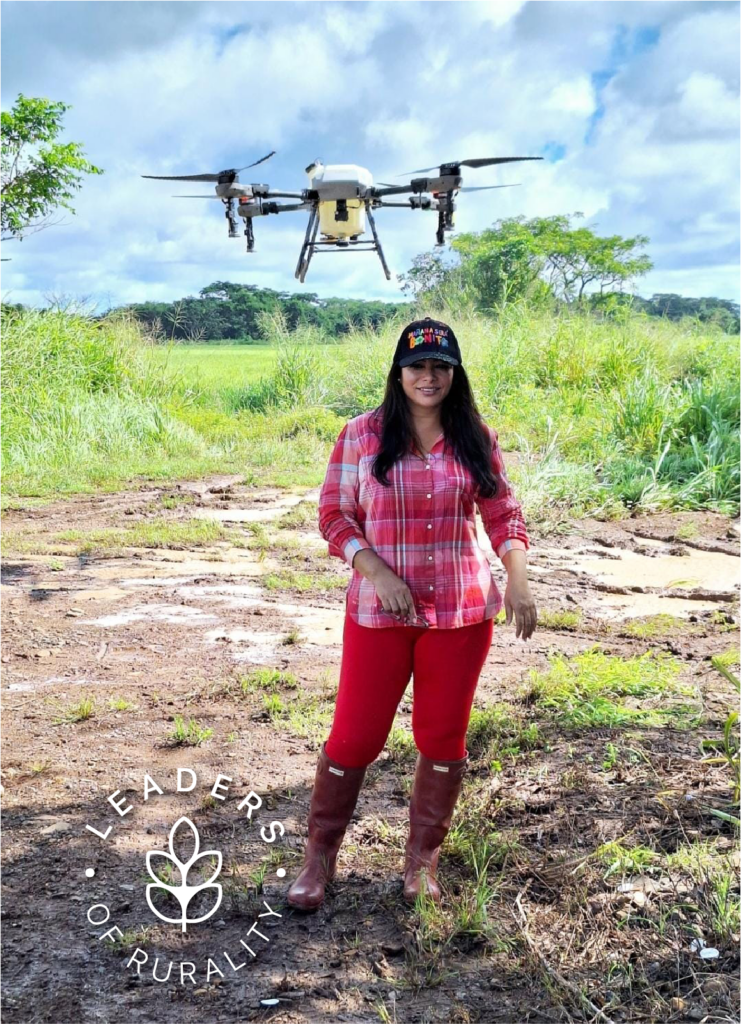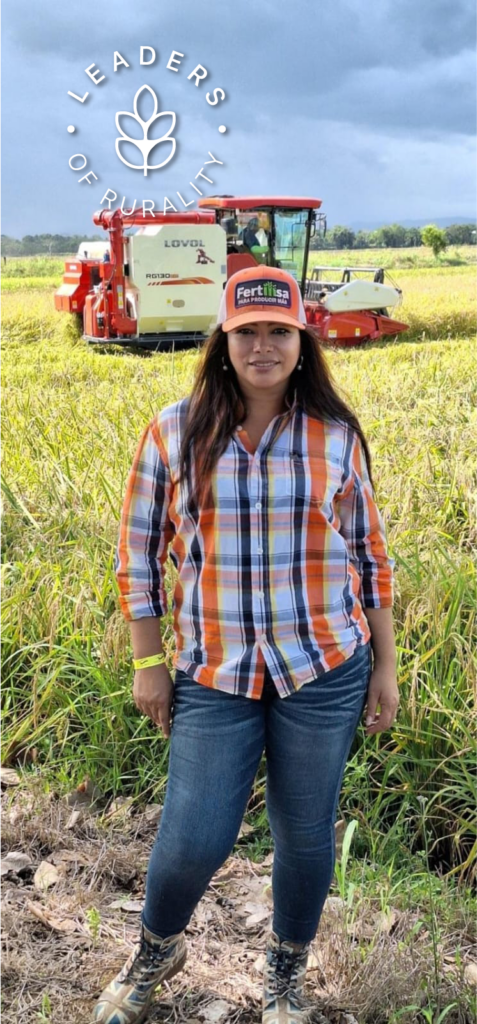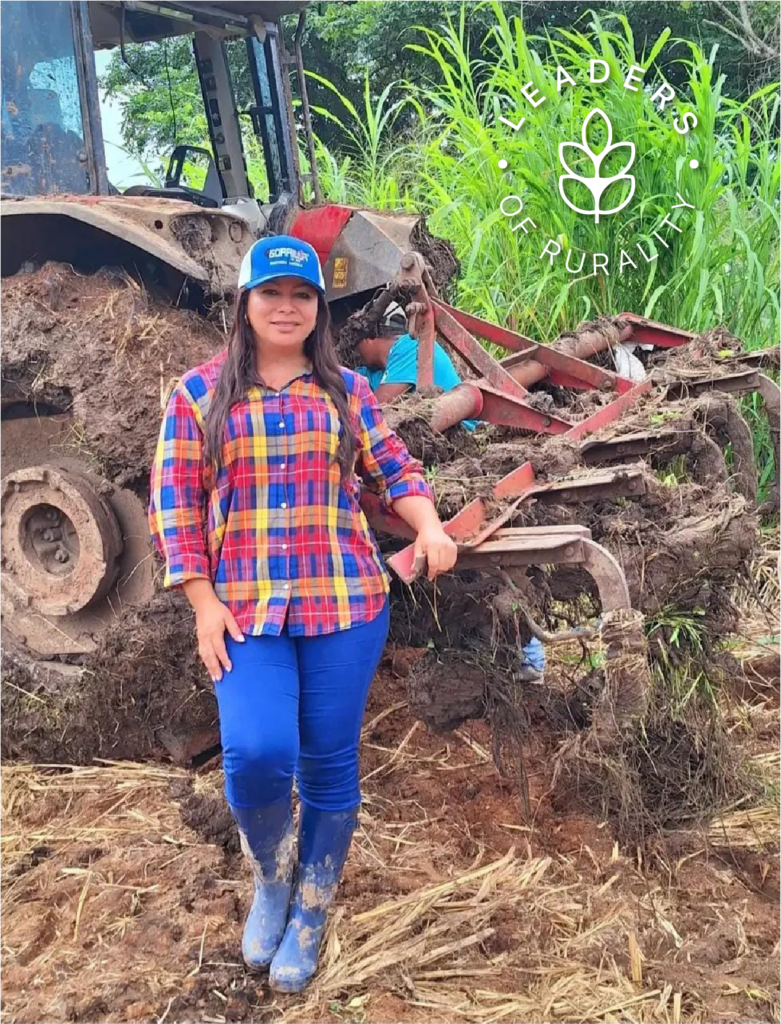
Karen González Campinez blends tradition and technology in her agricultural work. From her farm in Panama, she promotes sustainable, low-carbon rice production.
San José, 23 May 2025 (IICA) – Karen González Campinez, a Panamanian rice producer, creative advocate for the values of the land, and promoter of technological innovation, has been recognized by the Inter-American Institute for Cooperation on Agriculture (IICA) as a Leader of Rurality of the Americas.
Karen’s multifaceted journey began at just thirteen years old, when she took part in a regional contest alongside 300 other young people from Latin America. She had to write an article on the environment, and over the years, this activity began to naturally intertwine with her artistic passions.
By the time she was eighteen, she had founded her own organization, Zona Verde, together with her fellow dance and theatre students. Back then, without “a budget to do big things,” the members of Zona Verde “focused on small things, like picking up trash or cleaning beaches. That’s how we started.”
During those activities, she also realized that with young people, she had to compete with increasingly sophisticated (later smart) mobile phones for their attention. Simply gathering her students in a classroom and giving a seminar on environmental protection “wasn’t enough, but with theatre and dance I noticed I got better results.”
“That was twenty years ago,” recounts the Central American entrepreneur, before pointing to new technologies that distract both youth and adults, particularly social media. “Everyone is moving at a thousand—or a million—miles per hour,” and hardly anyone “has the patience anymore to sit and listen to a talk, even if it’s on something interesting.”
Still, there is hope, because “young people love to act, memorize lines, and try to be the best performer.”

Innovative and committed to the future of farming, González uses technological tools such as drones to optimize crop management and reduce the environmental impact of rice production.
After building a strong artistic career, Karen reconnected with the land. “I was born in a city, but I grew up in a rural area,” González recalls, “learning to love nature,” and “listening in the afternoons to the stories my grandfather told me, which made me fall in love with the countryside forever.” Even back then, she says, “I told myself part of my life would be about taking care of this, the land where I grew up.” She adds, “I also love producing,” something she learned from her father, a cattle rancher. “I saw how beautiful it is to receive the fruits of the soil—but trying not to harm the land.”
Motivated by the opportunity of a favorable agricultural financing program, González began cultivating rice, while staying true to her values. Today, she manages 100 hectares of irrigated rice and another 200 hectares of rainfed crops.
“I started researching which brands were environmentally friendly.” During that process, she says, “the fantastic NAMA program from IICA came to me like a gift from heaven. It taught us how to produce with lower greenhouse gas emissions and less agrochemical use.”
Rice is an obvious choice in a country where it is practically a national staple. Beyond cultivating it, González also promotes and defends it in her role as president of the National Association of Women Producers and Pioneers in Low-Carbon Rice (ANPPAC), which was born under the NAMA program. Speaking to a Panamanian newspaper, Karen explained that the women producers “not only wanted to organize but also to take advantage of international opportunities that support women’s participation in agriculture.”
Alongside their production and marketing goals, the members of ANPPAC seek to reinforce the meaning of rice, a vital global food grown and harvested by women. One of the projects aimed at highlighting this symbolism involves packaging the rice in pink bags, with a QR code that allows consumers to scan and access information about “who produced it, where it came from, and the effort and processes behind making it a healthy product.”
“We created ANPPAC because here we have many associations of men,” says González, emphasizing the word “many.” In Panama, there were no women producers’ groups, “despite the fact that women have always produced” in rural areas. The women in the association, she continues, “decided it was time people knew that we do this too—and that we not only produce but also care for our homes, our families, and the health of our children.”
Panama’s “pink” rice is already taking shape and preparing to break barriers. Several presentations have been made and “everyone thought it was fantastic,” says Karen enthusiastically. Comparing her two main fields—environmental advocacy and rural life—she notes that the former offers real gender equality, whereas in agriculture, disparities still exist.
For example, she points out that rice cultivation “has always been a traditionally male activity”—a space where, she admits, she did not always feel welcome and was even told to “go back home and play with dolls.” Some male producers, she reveals, “don’t take women’s opinions very seriously,” but “we share those opinions anyway because we’re not afraid.” In fact, González proudly says that Panamanian women producers have already won an important “battle”: “we get more media coverage than men now, and they’ve had to accept us.”
Drones vs. tractors
Looking ahead, Karen—who is an industrial engineer—says many of her goals involve adding more technology to her land, adopting the latest irrigation innovations, and expanding the use of drones. These unmanned aerial devices can be “more effective in the field than a tractor, which rolls over the crops and causes the loss of many rice plants.”
“Anything that helps us produce better and be more efficient, we’re applying it,” promises González—from soil studies to using satellite tools that, through another IICA program, allow producers to receive regular updates on potential pest presence.

Karen—an industrial engineer—says many of her goals involve incorporating more technology into her land, applying the latest irrigation innovations, and expanding the use of drones.
She also says, “I’d really like to improve the seeds,” because “we need varieties with higher production potential and greater resistance to tropical diseases,” especially in a fully tropical country where “it rains a lot, which brings fungus and humidity.”
Does this tireless producer ever rest? “When I come home feeling stressed out, even if it’s 11 p.m., I dance,” says Karen, who is also a professional dancer. In addition, “I really enjoy continuing to study” and being able to balance work with personal life—which includes an agronomist husband (“who knows a lot about rice”), a sister and mother who live with her, and “although I don’t have children yet, I have two little nephews I’m guiding through this life of learning.”
“All limits are in the mind—there are no limits if you want to learn, and that goes for men and women,” says this Panamanian producer. “The most important thing is to make dreams come true, because dreaming is good, but you have to make them real,” says Karen, who concludes by affirming that the countryside is where she feels happiest—“seeing how the land gives me back all the love I give it.”
When you understand nature’s processes, “it gives you peace, tranquility, and happiness,” especially because “not everything is about money, even though it’s important.” If you work the land “with love and dedication, there will always be a benefit, a return, and deep personal satisfaction,” she says.
More information:
Institutional Communication Division.
comunicacion.institucional@iica.int











